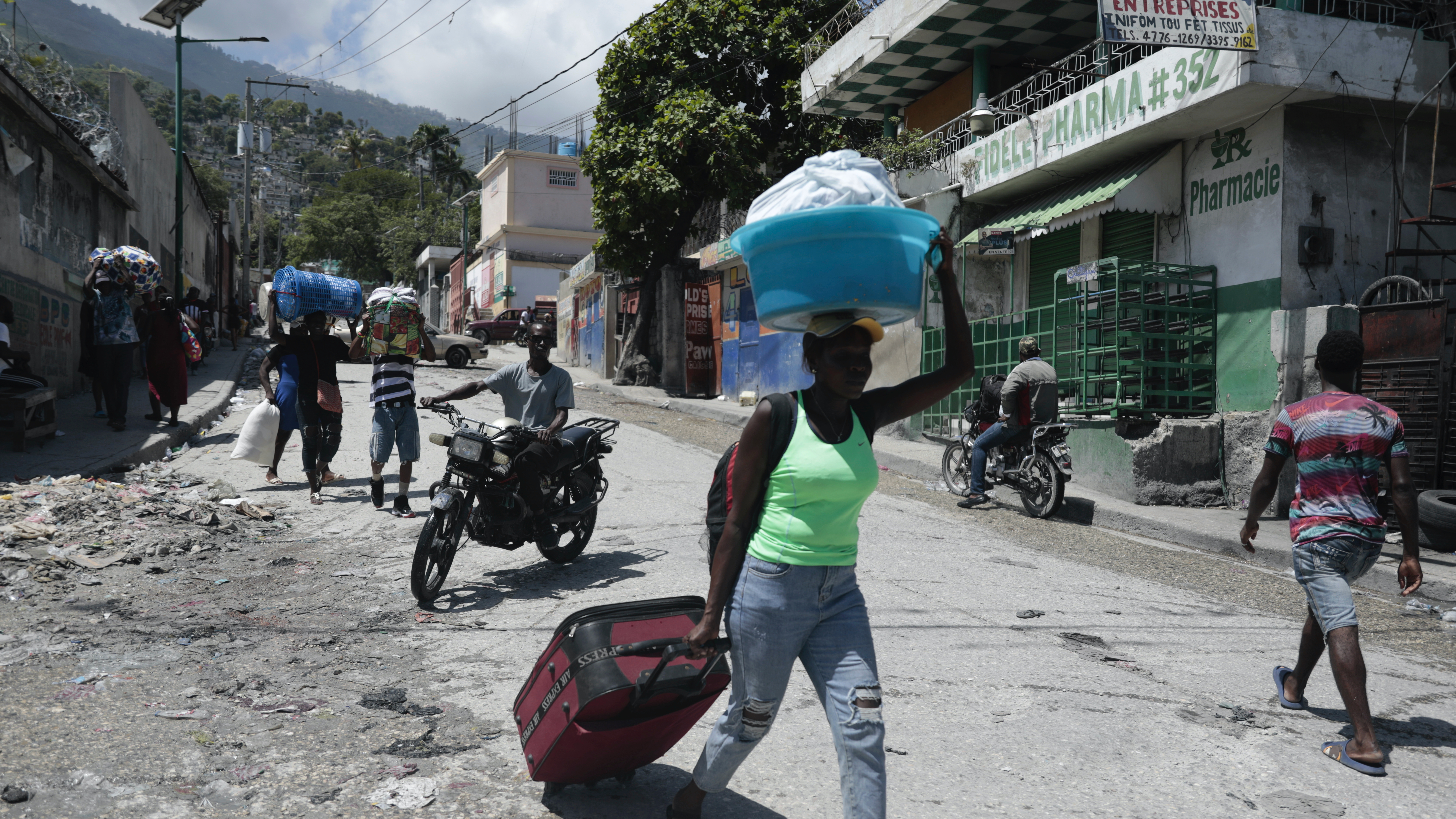On her way to work, Vélina Élysée Charlier said, she frequently sees dead bodies lying on the streets of Port-Au-Prince, the capital of Haiti. It’s the result of fights between violent gangs that control large swaths of the city.
“Gang violence has become our day-to-day,” she said. “You plan your day knowing that it may be the last time that you are able to go out, and knowing that you may not come back home alive. It’s that bad.”
Charlier, an anti-corruption activist in Haiti, said she’s particularly concerned about her four young daughters amid a rise in kidnappings — especially of girls and women.
The overall situation in Haiti has been deteriorating for many years, but things have rapidly declined since the assassination of President Jovenel Moïse in 2021.
Armed groups are said to control much of the capital; close to 3,000 Haitians have been killed by gang violence this year alone; hundreds of women and children have been kidnapped; and a third of the population is living on $2 a day or less, according to the World Bank.
The country’s fragile government requested international military assistance nearly a year ago. After that desperate appeal, Kenya, an African country with a history of sending peacekeepers to troubled areas, volunteered to lead a multinational effort to help Haiti combat the violent gangs.
On Monday, the United Nations Security Council approved a one-year deployment of such forces. It marks the first time in nearly two decades that a force would be deployed to Haiti.
“This mission comes at the request of the Haitian government and Haitian civil society to address the insecurity and dire humanitarian crisis the country has faced for far too long,” said Jeffrey DeLaurentis, the US deputy ambassador to the United Nations.
Responding to the news, Haiti’s Foreign Minister Jean Victor Geneus said “it is a glimmer of hope for this country.”
Kenya said it will send 1,000 police officers — pending parliamentary approval. Haiti’s Caribbean neighbors, Jamaica and the Bahamas, have also offered to deploy troops, and the United States committed $100 million in logistical support.
Renata Segura, from the International Crisis Group, said the success of the mission is by no means guaranteed because there will be some important logistical challenges.
“Gang members are not uniformed, and are living in the same areas as civilians, one next to each other, so it will be difficult for the troops to identify them.”
And, Port-Au-Prince lacks good urban planning and is full of difficult terrain, she said. Another challenge could be the language barrier, as the troops would mostly come from English-speaking countries.
But at this point, Segura said, there is no better option: “An international intervention is certainly the only way in which the spiral of violence in Haiti is going to stop.”
Haiti has a complicated history of international interventions. The last time that the UN was present in the country, there was a scandal over sexual misconduct. Also, the peacekeeping mission introduced cholera by mistake into Haiti’s water source in 2010. The outbreak killed thousands of Haitians.
“We have been seeing interventions in Haiti since 1994. Obviously, this is not working,” Charlier said. “What we have seen in the past is that whenever the mission leaves, the insecurity becomes worse than it was before.”
The fact that there is no one single elected official left in Haiti might be an added challenge for this mission, according to Juan Gabriel Valdés, ambassador of Chile to the United States who participated in the United Nations Stabilization Mission in Haiti (MINUSTAH) back in the 2000s.
“These gangs have nothing to do with the gangs MINUSTAH faced at that time. These gangs are much more violent. They are much [more] well-armed and they are much more brutal. Therefore, if you need to confront them, you will have to be tough,” he said. “And for that, you need a Haitian legitimate government that will authorize the use of force by foreign troops in the field.”
He said that there needs to be progress both on the military and the political sides.
William O’Neill, an independent consultant on Human Rights with the United Nations who traveled recently to Haiti, said the intervention is urgent.
“I think it’s one of these really tough situations where we decide, ‘I have to live first,’ and then, we’ll sort out the politics,” he said. “The people are so endangered and terrorized that something needs to happen as soon as possible.”
Todd Robinson, the US assistant secretary of narcotics and law enforcement affairs, was optimistic in a recent conversation at the Wilson Center in Washington, DC.
“The United States is committed to making this mission a success,” he said. “The Kenyans have stepped up to lead this thing, but we would expect other countries to step up, either in-kind, with equipment or financially.”
He said they will provide intelligence support that specializes in criminal networks, and with that, the mission has the potential to be a successful first step to bringing peace to Haiti.
The story you just read is accessible and free to all because thousands of listeners and readers contribute to our nonprofit newsroom. We go deep to bring you the human-centered international reporting that you know you can trust. To do this work and to do it well, we rely on the support of our listeners. If you appreciated our coverage this year, if there was a story that made you pause or a song that moved you, would you consider making a gift to sustain our work through 2024 and beyond?
